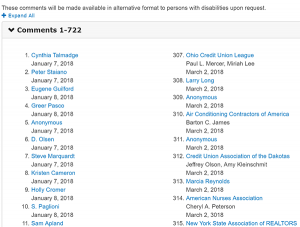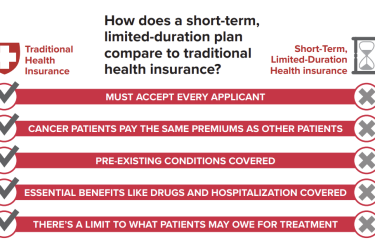 What can journalists learn from reading the comments that health care professionals send to federal agencies that propose new rules for health insurers? The short answer is: quite a lot.
What can journalists learn from reading the comments that health care professionals send to federal agencies that propose new rules for health insurers? The short answer is: quite a lot.
Last year, Noam N. Levey poured over about 10,000 comments from health care provider organizations and other groups submitted to federal agencies about their concerns regarding the Trump Administration’s plans to revise the rules for short-term health insurance plans and association health plans. What Levey found was almost unanimous opposition to both proposals. In a new tip sheet, Levey explained what he found while reviewing the comments on both proposals and offered ideas that may be useful for other journalists considering doing a similar review.
The federal Department of Labor’s Employee Benefits Security Administration issued the first of the two proposals. On Jan. 5, 2018, the administration published a proposed rule for association health plans designed to make it easier for self-employed Americans and small businesses to band together to form association health plans. The federal Department of Health and Human Services published the second proposal on Feb. 21, 2018, allowing short-term, limited-duration health insurance coverage for any period of less than 12 months.
It would stretch the truth to say that Levey, who covers national health policy for the Los Angeles Times, could predict the future, but consider what happened since those two proposals became formal rules.
Since April, journalists have reported that short-term plans have harmed consumers and that some of those consumers have sued the companies issuing those plans. Levey reported, for example, that Health Insurance Innovations Inc., a company in Tampa, Fla., that promoted short-term plans, agreed to pay $3.4 million to settle a 43-state investigation of the company’s sales and marketing practices. On April 2, the LA Times published that article, “Skimpy health plans touted by Trump bring back familiar woes for consumers.”
Two months later, lawyers with the firm Levine Kellogg Lehman Schneider + Grossman in Miami and with The Doss Firm in Atlanta filed a class-action lawsuit against Health Insurance Innovations and Health Plan Intermediaries Holdings in what the lawyers alleged was a fraudulent insurance scheme. The lawsuit alleged that hundreds of thousands of consumers were defrauded because they were led to believe that their limited benefit indemnity plans and medical discount plans were major medical insurance that complied with ACA.
Reed Abelson reported for The New York Times that such complaints highlight the flaws with some types of lower-cost health insurance plans. The Association for Community Affiliated Plans and the National Alliance on Mental Illness has sued the Trump administration over relaxation of rules for these plans, she added.
Also this spring, association health plans have faced a legal challenge. In March, Katie Keith reported for Health Affairs that Judge John Bates of the federal District Court for the District of Washington, D.C., ruled that the DOL’s 2018 final rule on association health plans was unlawful. One month later, the DOL filed an appeal of the ruling.
Note that the article Levey wrote based on his deep and thorough analysis of comments from individuals and interest groups was published on May 30, 2018. It carried this headline, “Trump’s new insurance rules are panned by nearly every healthcare group that submitted formal comments.”







